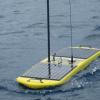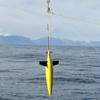Liquid Robotics announced its Pacific Crossing (PacX) Challenge is now open to scientists around the world. During the PacX Challenge, four of the company’s Wave Gliders marine robots will launch off the coast of Northern California and attempt to travel the longest distance at sea by an unmanned marine vehicle.
According to Liquid Robotics, the robots will travel together to Hawaii and then take separate routes across the Pacific, one pair arriving in Japan and the other in Australia.
The robotic gliders will traverse areas that have not previously been remotely surveyed, and they will transmit data regarding environmental conditions such as salinity, temperature, wave activity, fluorescence, and more. The data will be available online to interested parties who register at www.liquidr.com/pacx.
Ed Lu, chief of innovative applications at Liquid Robotics, invited the scientific community to "embark on a grand challenge journey on a voyage of scientific discovery."
Said Lu, "I challenge all scientists who are interested in advancing ocean exploration to take advantage of this unique opportunity. What scientific questions can we address with this new and unique data set?"
Scientists who are interested in participating are required to submit a one-page research abstract outlining their scientific intentions for the data collected during the Pacific crossing For more details on applying for the competition, visit www.liquidr.com/pacx.
The grand prize winner will receive six months of free Wave Glider data services and will work with Liquid Robotics to chart the course and mission for the six month deployment, including sensor configuration.




-thumb-100x100-10903.jpg)








Leave a comment